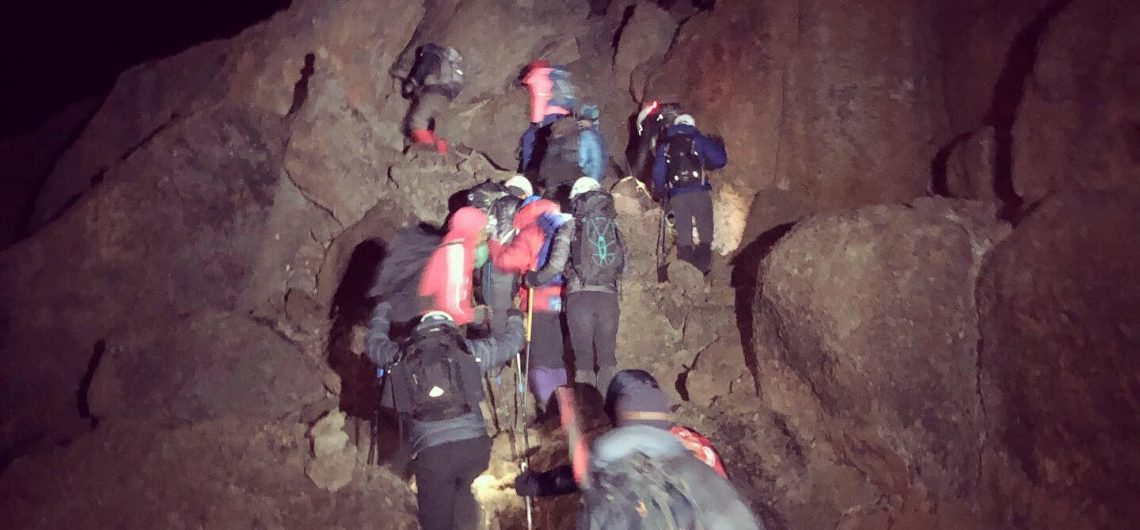Summit night as people say is the most challenging part of climbing Mount Kilimanjaro. You are required to wake up at around midnight to start your journey to the summit point of Africa’s highest peak.
You’ve probably heard tales about the excruciating summit night on Kilimanjaro. The 1000-meter elevation gain, the lack of sleep, and the nighttime hike all seem like good reasons not to go. So why don’t we get a full night’s rest and rise when we usually do? We would have recovered from the trip to Kosovo Camp and would be well rested. So begs the question, why do we have to climb Kilimanjaro at night time? Although it can seem strange to climb Kilimanjaro at night, we’ll explain why in this article!
Why start the journey to summit Kilimanjaro at night?
The altitude is the first justification. Sleeping gets more challenging the higher you are. Kosovo Camp, which is located at 4800 meters, is our highest camp. Studies have revealed that at altitudes of 2,500 meters or more, sleep quality starts to suffer.
We aim to spend as little time as possible at high elevations. On day five of our Kilimanjaro journey, it takes us 4-5 hours to go from Karanga Camp to Kosovo Camp. This allows us to unwind, refuel, sip water, and take a nap before continuing on to the top.
We don’t stop for very long on the way from the summit to Karanga Camp. After taking an hour or two to recover, we proceed to Millennium.
After taking an hour or two to recuperate, we proceed to Millennium Camp.
Your sleep that night in Millenium Camp, which is located at 3,832 meters, may have been the nicest you’ve ever had. You’ll sleep like a baby because of the combination of the lower altitude and your weariness from trying to reach the summit.
To have enough time
On the sixth day of our walk, we break camp at midnight in order to allow ourselves adequate time. The journey up and down might take up to 14 hours, depending on the terrain and the group’s pace.
We typically break camp at 8 am and arrive to our next camp by mid-afternoon on a trekking day. If we set out from Karanga Camp at 8 am, we might finish our walk at 10 pm. The sun sets on Kilimanjaro between 6 and 7 pm, and the majority of hikers go to bed well before 10!
We have time to go carefully because we leave at midnight.
You risk missing the summit if you attempt to climb Kilimanjaro rapidly due to the consequences of altitude sickness.
Kilimanjaro is a whole other mountain at night. Typically, you can pause, take a look around, and determine your destination. You are solely dependent on others nearby, like the porters and guides when it is dark. To help you persevere, you need these folks close by. Everyone depends on one another and receives support from one another by putting one foot in front of the other!
Typically, it takes 7-8 hours to ascend from Kosovo Camp to Uhuru Peak and 2-3 hours to descend. This allows you time to take a nap in your tent so that you can have enough energy to travel to Millenium Camp later.
Water at Kosovo Camp
Before ascending Kilimanjaro, hikers frequently neglect to consider where their water will come from. While climbing Kilimanjaro, we rely greatly on the porters, and when you question trekkers about their experience on the mountain, they are frequently the first to mention the porters.
We don’t linger in the highest camp because they must hike for hours to bring water up to the camp, reducing the number of trips they must make.
The porters have not only removed our tents from Kosovo Camp but have them ready and waiting for us when we get at Millennium Camp.
Our porters are an amazing set of people, and if we stayed at high camp longer, the already unbelievably arduous task would become even more challenging.
Sunrise at Uhuru Peak
On summit night, the group preparing to climb Mount Kilimanjaro is palpably excited. The exhilaration is mixed with apprehension for some people as well as uneasiness.
Compared to the previous five days of hiking on Kilimanjaro, hiking in the dark is a totally different experience. The breathtaking views are no longer there to keep you entertained. There isn’t any group conversation with your buddies. You only have a small white patch on the ground coming from your headtorch.
Many individuals rely solely on the guides’ and porters’ music as they shuffle through the night to keep them going.
You continue to put one foot in front of the other while questioning why you’re doing it.
You eventually come to the realization that you can glimpse some of your surroundings. You feel a small boost as the sun begins to emerge and you can finally make out the conclusion of the apparently never-ending uphill struggle.
After six hours of zigzagging, the steep slope you were traversing comes to a plateau. You are at Stella Point and need to travel another 45 minutes to get to Uhuru Peak. The hill is significantly milder, and the pace isn’t quite as agonizingly slow.
Then it occurs. Over there, a golden light starts to appear. A sunrise’s hazy radiance is visible. Even though this sunrise isn’t the most magnificent or stunning in the entire world, it nevertheless makes you feel good. Standing atop the roof of Africa and watching the sunrise is an experience that must be had, not defined. Suddenly, it doesn’t seem like such a bad idea to climb Kilimanjaro at night.
It’s remarkable how having daylight lifts your mood. The gang is in a festive mood as they complete the final leg of their ascent, which is fueled by the sun. You have made it, finally.
![]()


Comments